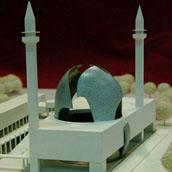Giordano's remarks provoked a wave of indignation and accusations that he was making common cause with Nazis and racists. These accusations were made all the more piquant by the fact that the 84-year-old Giordano's own first-hand experience of Nazi racial persecution as the son of a Jewish mother is the core theme of his writings. But according to the Turkish-born author and Cologne resident Arzu Toker, there are also many opponents of the mosque project to be found among the very people whom Germany's Islamic associations are presumed to represent: namely, the some 3 million or so residents of Germany, the majority of them of Turkish descent, who are commonly described as "Muslims," whether they practice Islam or not. Toker, a critic of the increasing influence of the Islamic associations in German public life, is the co-chair of the Central Council of Ex-Muslims of Germany. She spoke with the German monthly Konkret.
-o-
Toker: No. In the first place, Germans have a problem with Jews. When a well-known Jewish personality like Ralph Giordano says something, every word is placed under the microscope. If someone claims that they have found a problem, then there is a huge scandal. In the second place, Islamists have a problem with Jews. If you take a look in the Quran, you will find that there are maybe 30 anti-Christian verses, whereas there are hundreds of anti-Jewish verses. Animosity toward Jews is a central element of the Islamic faith. Then you add to this another factor: Although there are very few Jews in Germany, they are - as a result of the Holocaust - represented in all socially-relevant bodies. The Muslims in Germany, who are far more numerous, feel that they are not adequately represented, so they regard Jews with mistrust and envy.
Konkret: Are you surprised that Ralph Giordano's remarks provoked such vehement reactions?
Ralph Giordano on Talkshow "Streit im Turm", May 16, 2007

